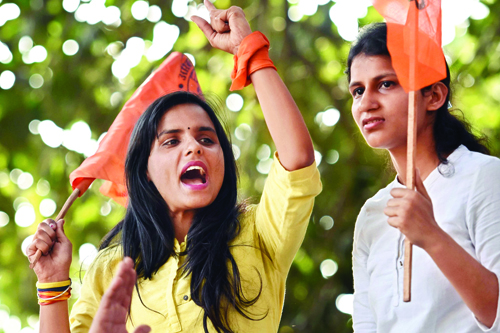Who is the “Intolerant Indian”?
- By : Anirban Ganguly
- Category : Articles

Who is the “intolerant Indian”? The intolerant Indian is one who cheers and showers plaudits on terrorists, whose sole aim, ideological and religious, is to break India and damage her democratic structure and spirit. The intolerant Indian is one who celebrates when ordinary Indian soldiers are mowed down by fanatical jihadis and term such acts – as legitimate retaliation. The intolerant Indian is one who, in the name of freedom of expression, barters away India’s national security, integrity, and unity all for a few sinecures, positions, and alms. The intolerant Indian is severely allergic and is repelled by the expression “anti-national.” Read This – Beyond politicisation of rape The intolerant Indian is one for whom the very idea of India, the very sensation of Bharat is anathema. The intolerant Indian opposes any move that consolidates our sense of nationhood and our national idea. They hate the idea of “positive nationalism” – that derives strength and inspiration from our civilisation experience and seeks to understand and narrate India and the world, based on that experience. Read This – Visions of a modern minister The intolerant India forever champions the external reading of India, welcomes these especially if they are negative and happen to have originated in the Ivy Leagues of the West. The intolerant Indian, while denouncing imperialism, capitalism, western dominance is always desperate to dump her or his own mother land and at the first given opportunity, to rush to the rarefied climes of that capitalist and imperialist world. The intolerant Indian is one who carefully and craftily stitches together an “alliance of subversion” and weaves a nefarious narrative around it that calls for India’s disintegration, for her balkanisation and then passes these off or defends such positions as sanctioned by freedom of thought. The intolerant Indians are those who, when faced with a counter-narrative – however well-argued, fact-based, and logical – don the mantle of victimhood and give out a false cry of “intolerance.” Over the years, groups of intolerant Indians have practised a sort of academic apartheid in campuses across the country and have marginalised, segregated, and boycotted all those who have dared to take them on intellectually. The intolerant Indian has in fact permeated academic institutions, controls social science institutions, has exerted a stranglehold on narrative building in the country, has victimised and hounded everyone whose reading of India, of Indian society, of Indian civilisation, of Indian religious and spiritual thought has differed from them. The intolerant Indian revels in deconstructing India, in aligning with subversive elements across the world to try and bring to fruition that deconstruction. The intolerant Indian deludes the marginalised, eggs them on to an imaginary and false revolution, uses them as cannon fodder for their utopian revolts and eventually tramples them under the burden of their own hopes and aspirations. The intolerant Indian excels in narrative control, in propaganda and in subterfuge. They adapt to violence as easily as fish to water, they use and practice violence in a substantial manner and argue it off as the necessities of the counter-revolution which needs to be implemented in order to liquidate class enemies. They support and gather resources for those who believe in violence and through the barrel of the gun push through their revolutionary designs. The intolerant Indian passes of racketeers and extortionists in the jungles of Bastar and of Abujmaad as freedom fighters and idealistic renunciates and in their support gathers resources and support even if it comes from quarters known to be working against India herself. They cleverly camouflage their actual loyalties, by a web of words and nomenclatures – state versus country versus nation versus peoples’ voice versus freedom etc – and promote an agenda that is both insidious and divisive. The intolerant Indian has been intolerant towards anyone opposing these extortionists; they label them as oppressors and casteist fascists. “Swearology” comes easily to them; they excel in using the choicest expletives aimed at Indian traditions and have, historically, denounced nearly every thinker and thought-leader that India has produced in modern times. The intolerant Indian allures young minds to their causes, confuses them ideologically, disorientates and fatigues them mentally, depletes them intellectually and then drives them to self-annihilation. They believe in politicking over corpses. The intolerant Indian is also one who says that the government voted to power under Narendra Modi in 2014 is actually a minority government and does not reflect the will of the people. The intolerant Indian scoffs at the earthy democratic sense of the people of India just because they have chosen, between 2014 and 2019, to start with, to support Modi and see him in office. The intolerant Indian scoffs at democratic verdicts, especially if these happen to be in favour of those they politically and ideologically oppose. Under that rubric and mindset the Narendra Modi-led government, for them, is a minority government resorting to oppression. The intolerant Indian, while abusing Modi, continue to hold on to positions of power, latches on to offices of profit and of prestige, they refuse to give up even if the dispensation changes. The intolerant Indian believes that the distribution of the fruits of development must be denominationally determined and not be uniform. She or he is intolerant towards anyone who exposes such a double-standard and opposes such a mindset. It is they who had a problem with the reference to “kabristan-smashanghat.” Their politics thrives on conflict and discrimination. Can there be space for such an “intolerant Indian” in the country then? Surely not!

















